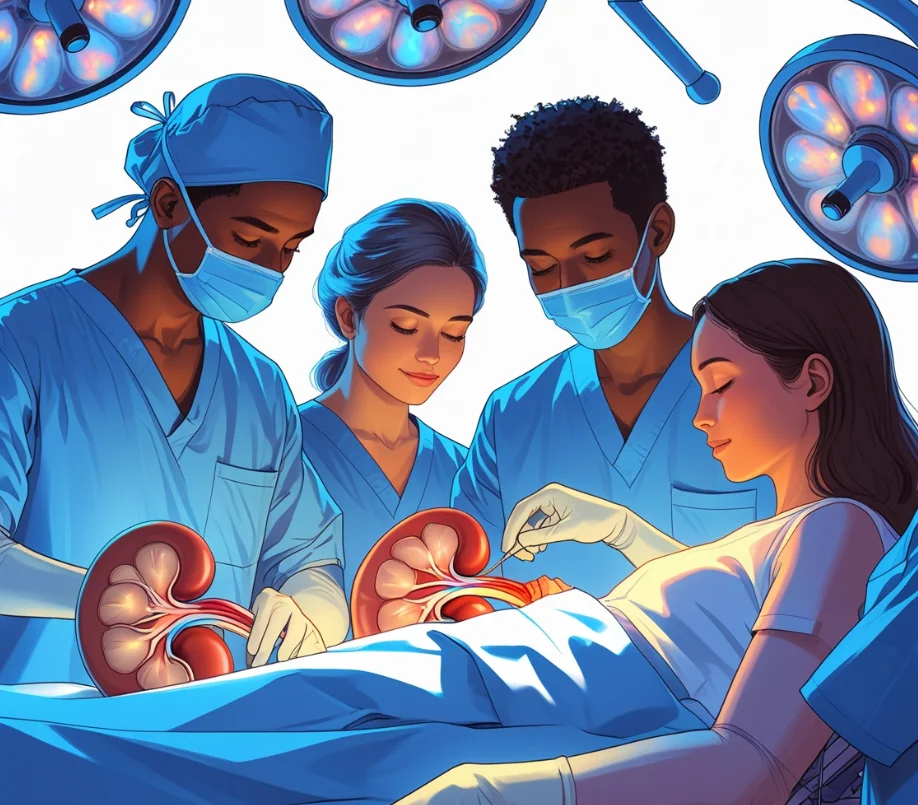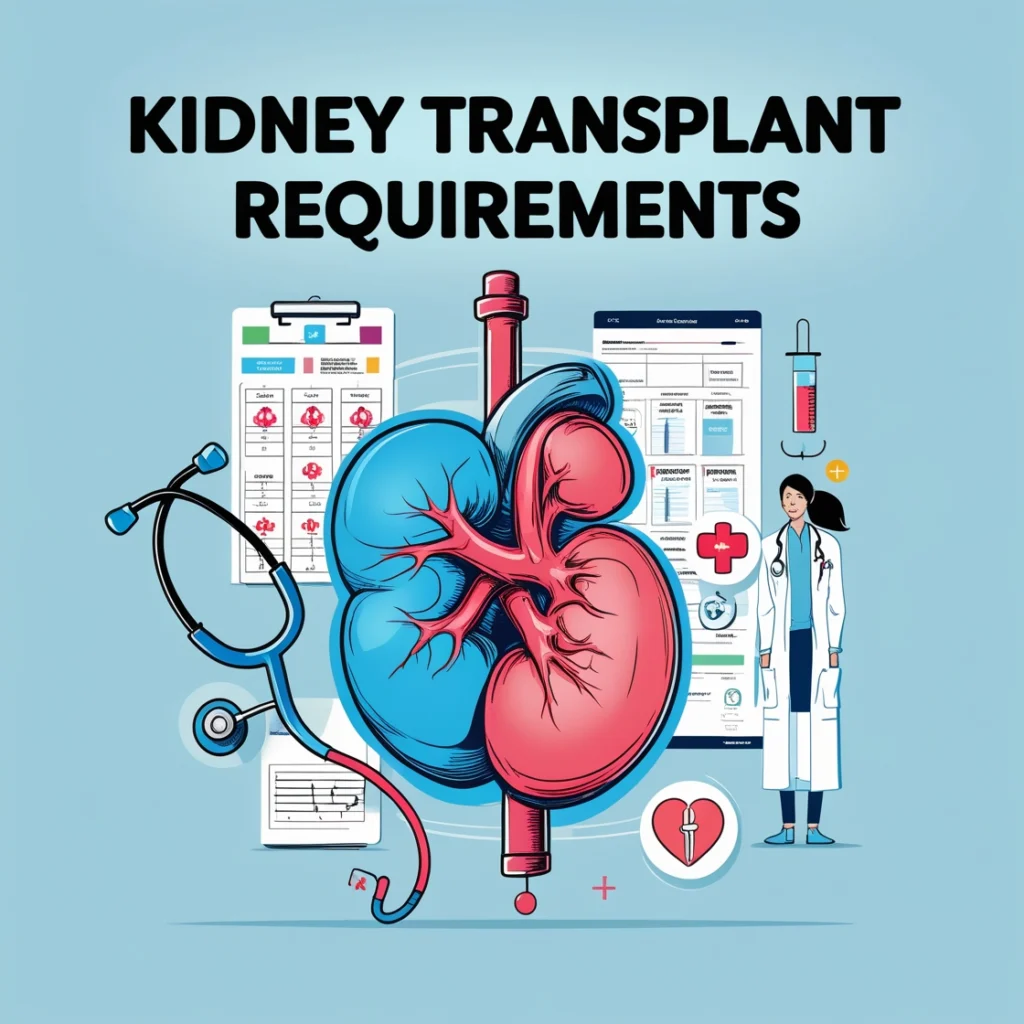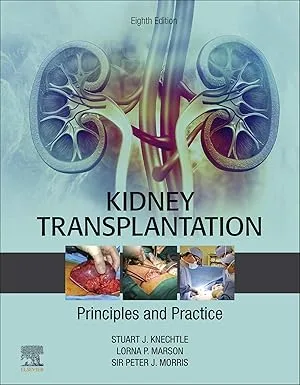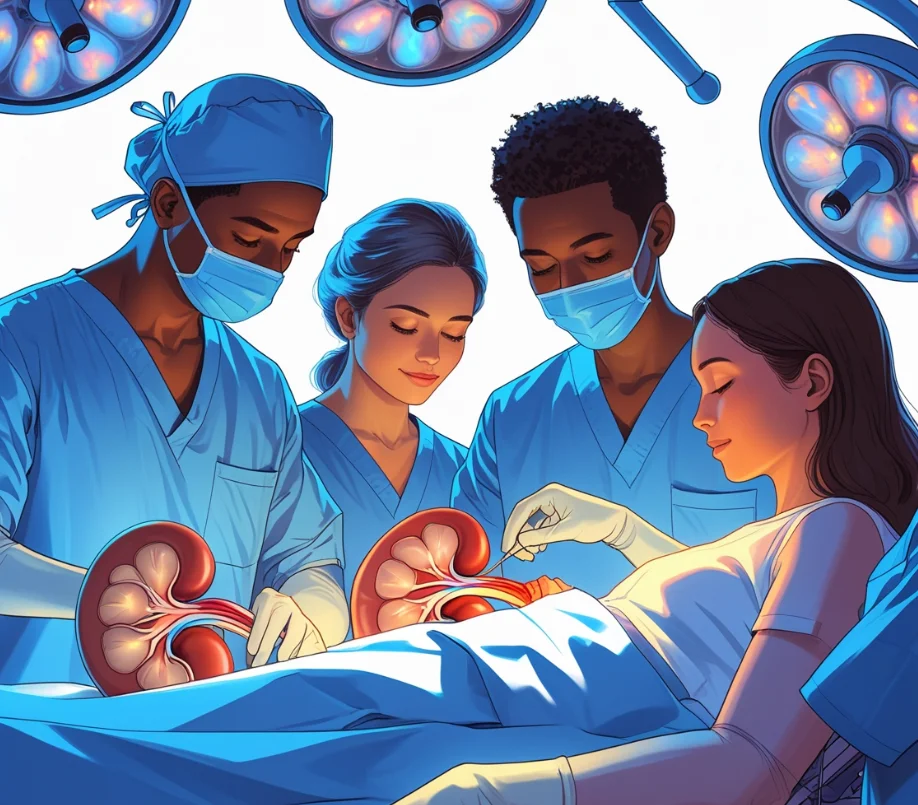Kidney Transplant Guide
Kidney Transplant Guide. A kidney transplant, sometimes known as a renal transplant, is a treatment for kidney failure at end stage renal disease (ESRD). Kidney transplant surgery is a major surgery during which a person with kidney failure receives a new kidney—either from a living donor or a deceased donor. A successful kidney transplant is closest to natural kidney function and considered the most effective treatment for ESRD—offering a chance for a longer, healthier life.

Indications
All patients with end stage renal failure (GFR<15 ml/min) or those with CKD stage 4 (GFR 15-29 ml/minute) with progressive disease should be assessed for renal transplantation.
Contraindications, both absolute and relative, to kidney transplantation are shown in Table 1.
| Absolute | Relative |
| Untreated malignancyActive infectionUntreated HIV infection or AIDSAny condition with a life expectancy <2 yearsMalignant melanoma within the previous 5 years | Co-morbidities, e.g. diabetes mellitusAge >65 yearsObesityHBV or HCV infectionPrevious malignancy (depending on type) |
What is a kidney transplant?
A kidney transplant is a surgery done to replace a diseased or injured kidney with a healthy kidney from a donor. The kidney may come from a deceased organ donor or from a living donor. Family members or others who are a good match may be able to donate one of their kidneys. This type of transplant is called a living transplant. People who donate a kidney can live healthy lives with one healthy kidney.
How To Get a Kidney Transplant
By producing urine, the kidneys filter the blood, removing waste, minerals, and fluid. When kidneys lose their capacity to filter, dangerous amounts of fluid and waste build up in the body, raising blood pressure and leading to kidney failure (end-stage renal disease).
The main treatment options for patients with kidney failure are Kidney transplantation and dialysis. Kidney transplant procedure provides the best treatment options for patients with established kidney failure.
Key Takeaways;
- You may require a renal transplant when your kidney has stopped working.
- There are 2 types of kidney transplants: living and deceased donor transplants.
- Not taking anti-rejection medication can lead to a failed kidney transplant.
What Is a Kidney Transplant?
A kidney transplant, also known as a renal transplant, is a major surgery during which a person with kidney failure receives a new kidney either from a living donor or a deceased donor.
How do I get ready for a kidney transplant?
Kidney Transplant Guide. To get a kidney from an organ donor who has died (cadaver), you must be placed on a waiting list of the United Network for Organ Sharing (UNOS). Extensive testing must be done before you can be placed on the transplant list.
A transplant team carries out the evaluation process for a kidney. The team includes a transplant surgeon, a transplant nephrologist (healthcare provider specializing in the treatment of the kidneys), one or more transplant nurses, a social worker, and a psychiatrist or psychologist. Other team members may include a dietitian, a chaplain, your primary care provider, and an anesthesiologist or nurse anesthetist.
The evaluation includes:
- Mental health evaluation. Psychological and social issues involved in an organ transplant, such as stress, financial issues, and support by family and significant others are assessed. These issues can greatly affect the outcome of a transplant. The same kind of evaluation is done for a living donor.
- Blood tests. Blood tests are done to help find a good donor match, to check your priority on the donor list, and to help the chances that the donor organ will not be rejected.
- Diagnostic tests. Diagnostic tests may be done to check your kidneys as well as your overall health status. These tests may include X-rays, CT scan, ultrasound, kidney biopsy, and dental exams. Women may get a Pap test, gynecology evaluation, and a mammogram.
The transplant team will weigh all the facts from interviews, your medical history, physical exam, and tests to determine your eligibility for a kidney transplant.
Once you have been accepted as a transplant candidate, you will be placed on the UNOS list. When a donor organ becomes available, you will be notified and told to come to the hospital right away.
If you are to get a kidney from a living family member (living-related transplant), the transplant may be done at a planned time. The donor must have a compatible blood type and be in good health. A mental health check will be done to be sure the donor is comfortable with the decision.
These steps will happen before the transplant:
- Your transplant team will explain the procedure to you, and you can ask questions.
- You will be asked to sign a consent form that gives your permission to do the surgery. Read the form carefully and ask questions if something is not clear.
- If you have been on routine dialysis before the procedure, you will get dialysis before the procedure.
- For a planned living transplant, you should fast for 8 hours before the operation, generally after midnight. In the case of a cadaver organ transplant, you should start to fast once you are told a kidney has become available.
- You may get a sedative before the procedure to help you relax.
- Based on your medical condition, your transplant team may ask for other specific preparations.
Why might I need a kidney transplant?
You may need a kidney transplant if you have end-stage renal disease (ESRD). This is a permanent condition of kidney failure. It often needs dialysis. This is a process used to remove wastes and other substances from the blood.
The kidneys:
- Remove urea and liquid waste from the blood in the form of urine. Urea is made when foods containing protein, such as meat, poultry, and certain vegetables, are broken down in the body. Urea is carried in the blood to the kidneys.
- Balance salts, electrolytes, such as potassium and sodium, and other substances in the blood
- Make erythropoietin, a hormone that helps red blood cells form
- Regulate blood pressure
- Regulate fluid and acid-base balance in the body to keep it neutral. This is needed for normal function of many processes within the body.
Some conditions of the kidneys that may result in ESRD include:
- Repeated urinary infections
- Kidney failure caused by diabetes or high blood pressure
- Polycystic kidney disease or other inherited disorders
- Glomerulonephritis, which is inflammation of the kidneys’ filtering units
- Hemolytic uremic syndrome, a rare disorder that causes kidney failure
- Lupus and other diseases of the immune system
- Obstructions
Other conditions, such as congenital defects of the kidneys, may result in the need for a kidney transplant.
There may be other reasons for your healthcare provider to recommend a kidney transplant.
Kidney transplant requirements
If you choose to have a kidney transplant surgery, you should know that your best chance for a successful transplant depends on certain factors. Kidney transplant requirements include the following:

Kidney Transplantation – Principles and Practice: Expert Consult –
Offers state-of-the-art coverage of all areas of kidney transplantation such as preservation of kidneys; mechanisms of rejection and the induction of tolerance; techniques of laparoscopic live donor nephrectomy; and immunosuppression.

Good overall health
If your doctor feels you may be a good candidate, he or she will most likely recommend a kidney transplant. To make sure you are healthy enough for surgery, you will need to have a complete medical exam and a series of tests to screen for any medical conditions that may affect your ability to have a good outcome.
A good kidney donor match
For a kidney transplant to be successful, the new kidney must be from a donor who has the same tissue type and a compatible blood type. People with O blood type are the “universal donor” and are compatible with any blood type, while people with AB blood type are the “universal recipient” and can receive a kidney from a donor with any blood type. An ideal match is from a living donor with the same tissue and blood type, whose genetic characteristics are most like your own.
If getting a kidney from a living donor is not possible, you can still find a good match, but you will need to be placed on a waiting list to receive a kidney from a deceased donor. In either case, your Fresenius Kidney Care team can help connect you to the right transplant resources and specialists.
The right timing
With kidney transplants, the earlier the better. If possible, it is best to have your kidney transplant surgery before you actually need dialysis. However, like most people electing to have a kidney transplant, you may need to find a good donor match.
Since the average wait time is approximately 3 to 5 years, people waiting for a kidney donor will need to maintain their kidney function through dialysis treatments until a kidney is available. During your waiting period, you have a number of dialysis choices including home hemodialysis, peritoneal dialysis or in-center dialysis treatment options.
Types of Kidney Transplantation
There are two types of kidney transplantation:
Living Donor Transplantation
- The kidney is donated by a living person, usually a family member or a close friend of the recipient.
- The donor must undergo a series of medical tests to ensure that they are healthy enough to donate a kidney and that their kidney matches the recipient.
- The surgery is usually scheduled in advance, allowing both the donor and recipient to prepare for the procedure.
- Living donor transplantation has a higher success rate than deceased donor transplantation, allowing the recipient to receive a kidney more quickly.
Deceased Donor Transplantation
- The kidney is donated by a deceased person who has previously consented to organ donation or whose family has agreed.
- The donor must be healthy enough for their organs to be used for transplantation.
- The surgery is typically performed as soon as possible after the kidney becomes available, which may result in a shorter waiting time for the recipient.
- Deceased donor transplantation may have a lower success rate than living donor transplantation due to the increased risk of complications associated with using an organ from a deceased donor.






